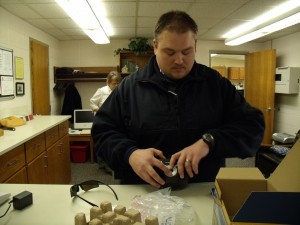Emergency Radio Checkup Time

Jamey Robinson seen replacing a non-functional emergency weather radio at the Oskaloosa Christian School
Jamey Robinson of Mahaska County Emergency Management spent all of Wednesday morning and a good portion of the afternoon inspecting local emergency weather radios for area agency’s. Tornado shelter plans were also discussed at some locations that needed further help in finding safe locations for children and staff to take shelter during violent weather.
Robinson checks the radio’s batteries and makes sure the units still function correctly twice a year. This is done to help help alert staff of schools and other city offices in case of weather or other emergency. The radio’s can also receive if there has been some other significant event such as a hazmat spill.
NOAA Weather Radio All Hazards (NWR) is a nationwide network of radio stations broadcasting continuous weather information directly from the nearest National Weather Service office. NWR broadcasts official Weather Service warnings, watches, forecasts and other hazard information 24 hours a day, 7 days a week.
Working with the Federal Communication Commission’s (FCC) Emergency Alert System , NWR is an “All Hazards” radio network, making it your single source for comprehensive weather and emergency information. In conjunction with Federal, State, and Local Emergency Managers and other public officials, NWR also broadcasts warning and post-event information for all types of hazards – including natural (such as earthquakes or avalanches), environmental (such as chemical releases or oil spills), and public safety (such as AMBER alerts or 911 Telephone outages).
Winter weather is fast approaching, and a good idea is to have enough food and water on hand along with a way to safely keep warm if travel is impossible, or the power has gone out. Oskaloosa has had it’s share of ice storms, and heavy snows in the last few years, and being prepared for such events helps you help yourself in time of crisis.
Winter driving is here any day. Do you have those necessary emergency items with you while you travel. Iowan’s die every year from attempting to walk to assistance when they become stranded during winter storms. These lists are not all inclusive as to what you may need, but they are a good baseline to start from.
Be prepared pack an emergency car kit…
- Jumper cables to restart engine
- Cat litter or sand for tire traction
- Shovel to scrape snow away from tires
- Ice scraper to clear windshield
- Warm clothes gloves, a hat, sturdy boots, warm jacket and even a change of clothes
- Blankets to keep warm inside the vehicle
- Flashlights and extra batteries for increased visibility
- First aid kit also pack necessary medications in case you are stuck on the road
- Food pack items containing protein such as nuts and energy bars, also canned fruit and a portable can opener are good additions
- Water bring enough for each person in your car and any pets
- AM/FM radio to listen to traffic reports and emergency messages
Also consider…
- Bring a fully charged cell phone if you have one with a list of emergency numbers (don’t forget your phone charger)
- Flares or reflective triangle
- Make sure your gas tank is full
- Baby formula and diapers if you have a small child
- If you find yourself stranded, be safe and stay in your car, put on your flashers, call for help and wait until it arrives
Those same storms that may strand you on the side of the road and make it impossible for you to travel could also effect your ability to get fresh water, or food.
The time to get “stocked up” is not when you hear about it on the weather, it’s good to have these things in place before hand so your assured you will have what is needed to weather whatever mother nature throws at us this Winter Season. Also check your batteries in not only your emergency weather radio, but your other electronics that you will rely upon in case of emergency (flashlights, radios and cell phones)
Home emergency kits should include….
- Water, one gallon of water per person per day for at least three days, for drinking and sanitation
- Food, at least a three-day supply of non-perishable food
- Battery-powered or hand crank radio and a NOAA Weather Radio with tone alert and extra batteries for both
- Flashlight and extra batteries
- First aid kit
- Whistle to signal for help
- Dust mask, to help filter contaminated air and plastic sheeting and duct tape to shelter-in-place
- Moist towelettes, garbage bags and plastic ties for personal sanitation
- Wrench or pliers to turn off utilities
- Can opener for food (if kit contains canned food)
- Local maps
- Cell phone with chargers, inverter or solar charger
Other items you may consider….
- Prescription medications and glasses
- Infant formula and diapers
- Pet food and extra water for your pet
- Important family documents such as copies of insurance policies, identification and bank account records in a waterproof, portable container
- Cash or traveler’s checks and change
- Important family documents such as copies of insurance policies, identification and bank account records in a waterproof, portable container. You can use the Emergency Financial First Aid Kit (EFFAK) – PDF, 277Kb) developed by Operation Hope, FEMA and Citizen Corps to help you organize your information.
- Emergency reference material such as a first aid book or information from www.ready.gov.
- Sleeping bag or warm blanket for each person. Consider additional bedding if you live in a cold-weather climate.
- Complete change of clothing including a long sleeved shirt, long pants and sturdy shoes. Consider additional clothing if you live in a cold-weather climate.
- Household chlorine bleach and medicine dropper – When diluted nine parts water to one part bleach, bleach can be used as a disinfectant. Or in an emergency, you can use it to treat water by using 16 drops of regular household liquid bleach per gallon of water. Do not use scented, color safe or bleaches with added cleaners.
- Fire Extinguisher
- Matches in a waterproof container
- Feminine supplies and personal hygiene items
- Mess kits, paper cups, plates and plastic utensils, paper towels
- Paper and pencil
- Books, games, puzzles or other activities for children
















[…] OMS Evaluates Emergency Plans Preparing To Stay Safe During Storm Season Severe Weather Awareness Week Continued With Tornado Drills Mahaska County Emergency Management Earns StormReady Recognition Drill necessary even in November Emergency Radio Checkup Time […]